Cost of cruising
Making Money while Cruising
06/02/14 21:16
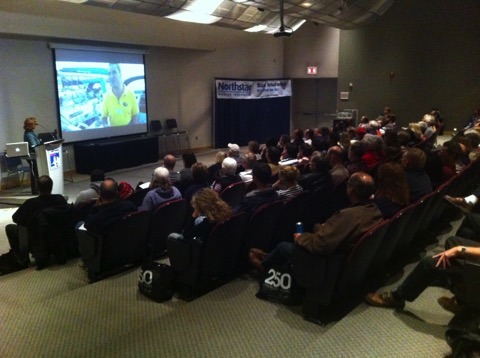
Sheryl conducting a seminar at the Toronto International Boat Show
Happy Winter! We hope you are keeping warm wherever you may be and keeping your mind on boating by attending one of the many boat winter shows, taking a boating course, or attending a local yacht club’s Speaker’s Night. For most of January, Paul and I have been on the road conducting seminars and doing presentations for snowbound sailors in the Northern USA and Canada since speaking, writing and DVD sales are an important part of how we earn a living in addition to the license fees we earn for our sailing adventure television series, Distant Shores.

Paul filming on the wreck of the Rhone in the British Virgin Islands for Distant Shores season 9.
One of the presentations we give that is always popular and generates lots of ideas and enthusiastic discussion is "Making Money while Cruising". This was the case once again recently at the Strictly Sail Chicago boat show where we had full houses for our weekend presentations as we also did at the Toronto International Boat Show. Now back on board our Southerly 49 sailboat, Distant Shores II, in the tropical warmth of St. Maarten in the Caribbean, I thought I would write about our experiences and those of other sailors who have found interesting ways of earning while cruising since we always get lots of questions about this.
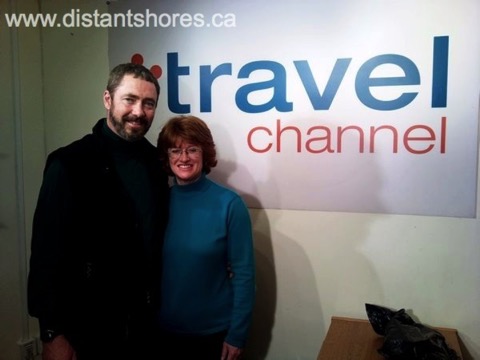
At the Travel Channel studio in London, England.
Travelling by boat, as I'm sure you'll agree, offers many pleasures and freedoms but can present plenty of challenges and heart-pounding moments as well. Adding financial stress to the adventure can really take the fun out of cruising so it's important to maintain a good financial base when out sailing long-term. As in life ashore, financial security provides freedom and peace of mind. The ability to earn a living while cruising then seems the ultimate freedom.

Paul and I feel blessed that our work as authors, speakers and the producers of the Distant Shores sailing adventure TV series as well as other travel documentary series has enabled us to earn our keep while living the cruising lifestyle for 24 years now. Although making money while cruising can be a tricky thing to manage, it is possible, and throughout our years of cruising we have met many sailors who are making cruising pay in positive and creative ways. There is probably a way that you can too. Here are some ideas...
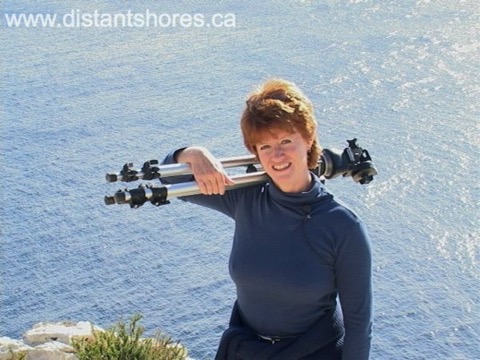
Sheryl on assignment in Malta in the Central Mediterranean.
Earning without Working - Investment Earnings
The easiest and most common way to make money while cruising is to have a nest egg of investments that earn a reliable interest rate while you're out having fun on the boat. Earning this way is the least work while you're sailing and, if carefully planned before you set sail, should hardly interfere with you're cruising itinerary as opposed to trying to take on jobs along the way. Ideally your investments should be low maintenance and easy to cash in with little or no penalty. This is not difficult to set up with the help of a financial adviser. Most cruisers we meet doing this have down-scaled their living costs by moving on board and sailing in affordable places so their investment earnings or retirement funds go further than when living ashore back home.
Since communications can often be tricky when travelling, it is generally advisable to establish a portfolio that doesn't require a lot of attention. If you have to be checking the stock market constantly or risking disaster if you're caught out in bad weather and can't get a call in to your stock broker or get on the internet it's just going to add to your stress level and be dangerous financially. This of course depends on where you're cruising since technology has improved to the extent that in so many places, even at sea or in a remote anchorage, you can get internet access and have good affordable phone service on board. We know of several cruisers who earn their money through serious trading but they are very experienced and treat it as a job by dedicating several hours a day to the process. They spend a lot of money on communications systems to guarantee they're connected.
Looking at things from the other side of the coin, when we sailed to Bermuda for the first time in 1997 we met a cruising stock broker from Connecticut who was handling the complicated investments of his high profile clients while cruising on his boat. He'd made the offshore voyage to Bermuda, something he'd always dreamed of doing, and having accomplished this he then set himself up at a dock in the harbour for several months with phone, fax and e-mail and was enjoying island life while working for his clients. Very occasionally he had to fly back to his office at home but by remaining in one location for a long period he was able to establish the reliable communications he needed to handle the investments of his clients and earn his living while cruising in paradise for the summer. This is an example of “Working while Cruising but Earning at Home” which I'll elaborate on later on.
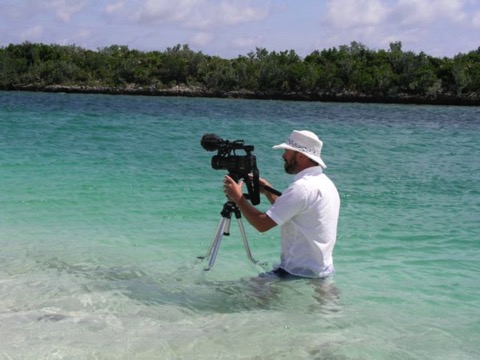
Paul at work in the Bahamas.
Royalties
Royalties from intellectual property that you have created in the past such as a book, computer software you have developed or, as in our case, license fees for television programs we have made in the past plus DVD/download sales is another way to make money without working while cruising since the income is from work you have done in previous years. For us, the income from DVDs and downloads of Distant Shores episodes which feature the world's best cruising destinations goes towards production costs of making new shows. By the way, many thanks to all of you for your support over the years. It's always a pleasure to meet sailors “out there” who have used the shows as resources for planning their own adventures. We hope they do/have done the same for you.
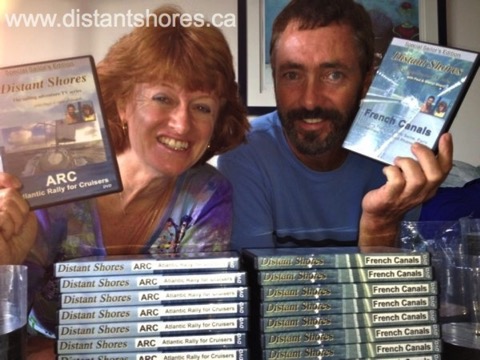
Every year we release new Distant Shores sailing DVDs that profile the world’s top cruising destinations to help you plan your own adventures.
Rental Earnings
Another popular method of making money while cruising without working while you sail is to move aboard your boat and rent out your house or other property that you own at a rate that covers the house expenses plus enough to maintain a simple cruising lifestyle, probably in addition to savings or other investment income. (I wrote more about this in a previous newsletter about “Maintaining a Home Base while Cruising”.) We meet many cruising sailors who are renting out their homes especially if they are out cruising for a set period of time – a summer, two years, etc. - and are planning to return home afterwards, or if they have just begun cruising and want the reassurance that they have their place to go home to if they find the cruising life isn't for them. Since property values generally increase over time, renting also helps maintain any investment in a home or other property. Then if you do eventually decide to sell, you can wait for a good time in the market and hopefully get a good return on your investment.
The importance of having access to good communication is also an issue when renting property. You must be in touch to look after your tenants needs or assign a reliable representative at home that your tenants can contact if they need the plumbing fixed or repairs made. A property manager can be hired if you do not have a friend or family member to help you out with this but hiring a property manager will reduce your earnings somewhat. The hassles you may be spared however will probably make it worthwhile.
The key to success with rental income is to be sure you have good tenants for the long-term that are not causing trouble with the neighbours or damaging your property. Bad tenants or a high turn-over of tenants which results in increased administrative time and cost can make this form of earning-while-cruising a nightmare but with carefully chosen tenants, earning income by renting your home or other property works well for many cruisers since it offers emotional as well as financial security in many cases.
Paid Sabbaticals
We've met many teachers who have arranged a sabbatical by deferring part of their salaries for several years in order to self-finance a planned leave of absence, with the guarantee of a job upon return. The typical model is the Canadian "five over four" in which 20 percent of a teacher’s pay is deferred over four years, and then the teacher is paid 80% of salary over the fifth year for the sabbatical leave of absence. Cheques are coming in while they playing beach volleyball on a tropical island somewhere. Could this be you?
Doing Work while Cruising but Earning Money at Home
Today with the accessibility of the internet while cruising, most sailors we know keep a blog or website and generate a following. If your numbers are significant this may be an opportunity to make money while cruising by monetizing your website. For example, selling your music CDs or downloads (cruising DVDs and downloads in our case). You can get sponsors for your page, sell advertising or set up affiliate links with companies such as Amazon and West Marine whereby if you mention or promote a product they sell while writing your blog, and visitors to your website click through to their website from yours and purchase a product, you receive a small commission. You have to work very hard at promoting the products to make much money at this but it does provide some additional income. The Zero to Cruising blog by Mike and Rebecca Sweeney and The Boat Galley by Carolyn Shearlock are good examples of this.

Join our email list and get hints, technical articles and tips plus videos to help you achieve your cruising dreams.
- FREE 1/2 hour video on cruising the Exuma Islands in the Bahamas
- Technical Blog shows you how to deal with issues facing the cruising sailor
- Destination information from some of the world's best cruising areas
- Special discounts and promotions
We work while cruising but earn money at home filming our sailing television show. Similar to travel writers and photographers on assignment, we do the physical work of filming, interviewing and scripting while traveling in foreign countries but we are selling the finished product at home. Since we're not earning money in the territory we are documenting in our television programs, work permits are not required although we must work with the tourist boards to obtain filming permits.
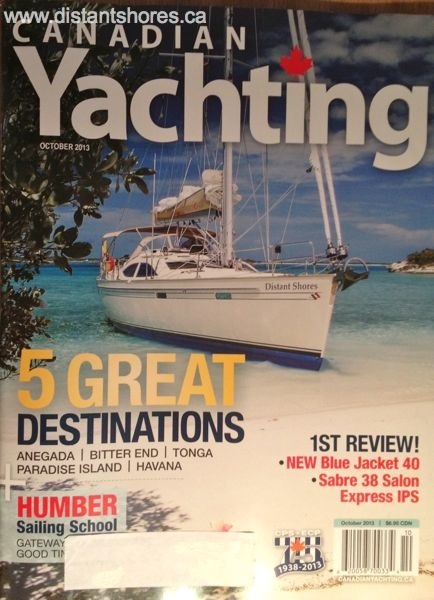
One of Paul’s cover shots on the October 2013 issue of Canadian Yachting magazine.
Other examples of working while cruising but earning money at home are working as a Virtual Assistant, writing a book or magazine article, doing software development or IT consultation while on your boat for clients back at home, the way the financial planner I mentioned earlier was doing.
Working Part-time
Many cruisers go home to do contract work or do work on a part-time basis for the company they worked for before setting sail. This is appealing since it provides some financial security and a chance to stay connected with your industry while sailing for a large part of the year. We've met sailors that run a B&B when they're home for the summer, then close down for the winter and go cruising in the tropics. Like us, they mostly store their boat in the location they finished their voyage in the year before rather than sail it back and forth each year. Marinas and boat yards around the world are set up for this. You fly back, launch, and carry on to new destinations. Job-sharing is another set-up we've seen working for part-time cruisers. Teachers share a class and each work different semesters. We met two brothers that owned a dinghy repair and servicing business who took turns managing the business so each could go cruising for six months each year. And yes, they shared the boat too.
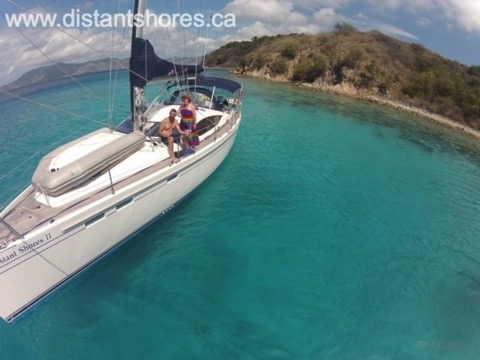
With advanced communications these days your boat can be your mobile office in beautiful locations such as the British Virgin Islands.
Finding Work Along the Way
Perhaps the most obvious way of making money while cruising is to set sail and work along the way. Unfortunately, this can be a very unreliable method of making money while cruising if you are constantly on the move and if it is your only source of income it can be very stressful. Most cruisers who work along the way do it only as a supplement to their travel funds. Having said that, we know lots of cruising folk who have worked their way around the globe and who find that working in a new place adds greatly to their cruising experience and understanding of the world. They generally have a specific skill that travels well such as carpentry or waitressing or bartending or teaching English as a second language or they charter their boat for part of the year or provide yacht maintenance services. But these folks are generally willing to take on any variety of jobs depending on what is available, so flexibility is key.
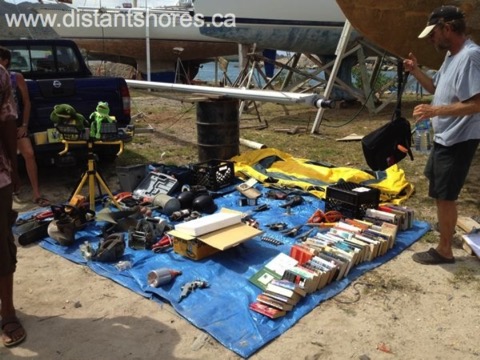
Selling off old gear at local boat swaps and "Treasures of the Bilge" sales is quick way to put some money in your pocket while cruising.
Working in other countries can often present limitations in the form of requiring work permits, local certificates of qualification, special coding for yacht insurance if you're running charters as well as charter permits and upgraded safety requirements, language barriers, and the like, but with advance planning the paperwork can be applied for and these obstacles dealt with and overcome.
If you have dual citizenship be sure to carry passports for both nations since this will open up work opportunities for you while travelling in other countries. In the Azores we met an American cruising couple who had dual citizenship in the UK and were computer professionals. They enjoyed taking on short-term contracts in countries they could sail to within the European Union. This way they had an interesting mix of cruising and job security in the countries they arrived in. We've met doctors, nurses, teachers and other professionals doing this too.
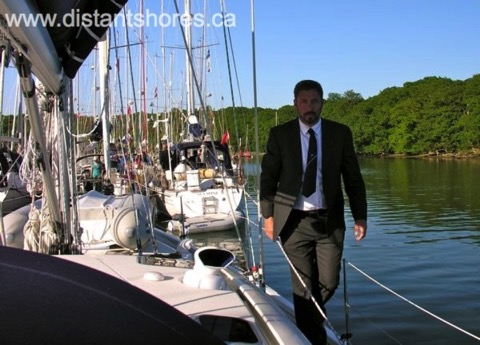
If working while cruising you may need a different set of clothes from your regular sailing attire.
Cruisers with skills useful to other cruisers such as refrigeration and engine repair often earn their keep just working within the cruising community wherever they go and where they are in constant touch with potential customers. Here you must be very careful since you may be taking work from local service people and work permits will be an issue. Realize that you risk large fines, deportation, or having your boat confiscated by working illegally.
On our last visit to Malta we met up with a British sailor spending the winter there before sailing on to Greece for the summer. He was a certified RYA instructor so was approached by many local sailors wanting to achieve various levels of training and RYA certification. He spent the winter teaching them on their own boats and was offered several delivery jobs as well. Like many work-along-the-way sailors, he didn't rely on this work as his only source of income but it was an enjoyable and rewarding way to top up his cruising fund and get involved in the local boating community while cruising at the same time.
Long-term cruisers generally find that it is nice to stop and stay in one place from time to time to catch their breath, maintain their boats, and find seasonal work while they do. Once they have established work contacts they often return to the same place each winter or summer or tourist season when extra workers are needed during busy times.
There are lots of wonderful and unusual ways to earn a living while cruising. In the Bahamas we met a statuesque Swedish hairdresser who gave topless haircuts on the beach! In remote places where she wasn't infringing on the business of local hairdressers she announced her services on the VHF net and only charged $5.00 for a basic cut or beard trim but always made a bundle. Sorry no photos :-) Musicians top up their cruising kitties performing at local events and by selling their CDs. Artists take on commissions and sell their artwork. The list is endless.
Making money while cruising is possible. It just takes a little patience and imagination - qualities all boaters with a dream possess!
Have you found ways to earn money while cruising? We’d love to hear about your experiences too. We welcome your comments and questions below...
Warm regards,
Sheryl and Paul Shard
Aboard SV Distant Shores II
Simpson Bay Marina
Sint Maarten, Dutch Antilles
Comments
Maintaining a Home Base while Cruising
24/11/13 16:38
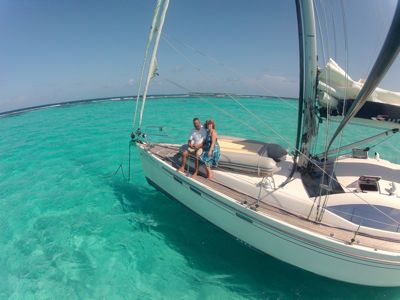
Aboard Distant Shores II in the Tobago Cays, St Vincent and the Grenadines
Right now we're counting the days to getting back to the boat in the Caribbean since we’re facing a major snow storm in Southern Ontario. But in 3 more days we'll be back on board our sailboat, Distant Shores II, in Grenada preparing for another season of sailing in the Caribbean.
Paul and I have been home in Canada for the last few weeks completing post production on the final episodes of Distant Shores season 9 which document the experiences of our recent cruise through the Leeward and Windward Islands of the Caribbean starting with the British Virgin Islands for the BVI Spring Regatta, St. Maarten for Carnival, diving and hiking in Dominica, riding out Tropical Storm Chantal in Martinique, and a special episode featuring top canal voyages that you can do with your own boat or by chartering. (The shows will soon be airing on television but if you can't wait, you can get them on DVD as well as HD digital download.)
Being home has got me thinking about the pros and cons of maintaining a home base while cruising, so today I thought I'd share our experiences. Paul and I have now been cruising for 24 years. We initially opted for the “sell up and sail” style of cruising (1989 to 1998) but for the last 15 years we have maintained a home base - a condo town house in Ontario's “cottage country” north of Toronto - so we have lots of experience with both options.
Sell Up and Sail
When Paul and I were married in 1985 we had only been out of school for a couple of years but were committed to our dream of building a boat and going cruising before settling down. The dream had been burning since high school and we knew that if we didn't do it we would live with the regret forever. So it didn't make sense for us to put down roots and immediately start saving for a house like the rest of our 20s-something friends were doing. We were paying off our student loans and investing in our dream, which was building our own sailboat from a bare hull and deck and taking a 1-2 year sabbatical to sail it down south - a delayed “gap year” of sorts.
We got a lovely, yet surprisingly affordable, waterfront apartment overlooking the Port Credit Harbour Marina and Port Credit Yacht Club, our home club on Lake Ontario west of Toronto, where we could build our Classic 37 sailboat in the boat yard right at our doorstep. It was a convenient, supportive, inspiring environment for our dream. When we launched the boat after 2 years of building, had sailed her for a couple of seasons, and were ready to set sail, it was easy to just let the apartment go, store a few things with friends and family, sell our student furniture (we were so focused on our boat project we weren't tempted to buy new stuff for the apartment), car, etc., and say goodbye to financial commitments ashore . We no longer had to budget for things like car and home insurance, utilities, rent, cable TV, and all that goes with life on land.
It was quite freeing. Life afloat is is simple life and so is managing the basic expenses of the cruising life when you don't have financial commitments back home. Building our boat didn't save us any money. Home builders don't benefit from the volume discounts on materials that commercial manufacturers pass on to their customers but building our Classic 37 sailboat, Two-Step, allowed us to put our money into our project gradually, kept us involved and committed to our dream, and most importantly gave us knowledge and skills which saved us money once we were “out there”. When we sold up and went sailing we owned the boat free and clear which is also liberating.
That first cruise stretched into a 3-year voyage from 1989-1992 around the Atlantic Ocean via the USA, Bahamas, Bermuda, Azores, Spain, Portugal, Gibraltar, Balearics, Canary Islands, Brazil, Caribbean Islands and then back to Canada. We found our savings stretched out since we anchored a lot, shopped in local markets mostly cooking on board, and did all our own repairs and maintenance. It was an amazing life-altering experience but by the end we were travel weary and looking forward to getting home. The travel documentary we'd filmed, Call of the Ocean, was picked up by Discovery Channel and we got requests for a full TV series that would follow upcoming voyages.
Part-time Cruising
By then we'd been home for a year, living with my (Sheryl's) mother who is a widow. It was a good arrangement because Mom wanted to stay in the family home and us being there helped all of us financially, plus we felt good about being able to help out with chores and projects for the house. Paul's parents lived just down the street (Paul and I went to school together and have been friends since we were 7 years old) and our brothers nearby in neighbouring towns. It was the perfect arrangement since we were longing to be back with our families after being away for 3 years. They had all come to visit us on the boat during our time away of course and we'd had amazing times together, but a week here and there is pretty different from the real family involvement we find so enriching.
It was great to be home but after a year ashore Paul and I were itching to get back to sea. We missed living in the outdoors, working as a team running the boat, the stimulation of no two days ever being the same, the new sights, sounds and friendships which are the real treasures of the cruising life. Our brief time back home had re-charged our batteries. We were enthusiastic once again and a contract for our first full TV series, Exploring Under Sail, (co-produced with Canadian director, Peter Rowe) required us to sail and film for 6 months of the year with time at home doing post-production for the rest of the year.
We discovered this part-time style of cruising worked well for us since it provided a nice balance of long-term cruising and life ashore, meaning we never got tired of either. In fact, it made us savour and appreciate all the benefits of both more full. Sharing a house with my mother meant that while we were away we didn't have to worry about leaving an empty house and we were anxious to get caught up with one another when we got home. We kept up this arrangement living with Mom and cruising for part of the year for 6 years.
At the time, Mom was working as a full-time pharmacist. Then Mom retired and one of the things she was looking forward to in retirement was doing lots of entertaining. Paul and I had been working at home and this started to make it difficult to work sometimes. Also, us being there meant she didn't have the space for extended family and friends to stay while visiting when we were home. At about the same time Paul and I were at a point where we were missing having our own nest to feather. Our own furniture, dishes, artwork, and many other personal possessions that we treasured, including beautiful wedding gifts we'd never had the chance to use, were still in storage and had been for years. We'd also collected lovely things during our travels that we didn't have the space to display, use and enjoy either on the boat or in the rooms we stayed in at my mother's. We realized it was time to get a place of our own even though we'd only be there for part of the year. We both have a great relationship with my mother and we didn't want to strain it by this change in circumstances. The time was right.
Maintaining a Home Base
So we found a small but lovely condo townhouse north of the city in Ontario's cottage country on Lake Simcoe where Paul and I had both got our start in boating as kids.
It gave us the space for family and friends to visit on weekends. That it's a condo means that maintenance is handled by the condo association. We can just lock the door and leave when it's time to go cruising again. We have 2 neighbours, Dawn and Nancy, who run our office while we're away. They coordinate production details, fulfill DVD orders, and manage the administrative tasks involved with running a television production business. So our place isn't empty and is paying for itself through the business.
Renting
Many of our cruising friends who maintain a home base to come back to, rent out their condo or home, or sublet their apartment. This helps to cover costs and in many cases provides income as well depending on the type of property.
Several friends of ours own waterfront condos in popular tourist areas. During the high season they're out cruising, a property management agency handles renting out and handling maintenance on their furnished condos on a weekly and/or monthly basis. Our friends store their personal items during the time tourists are renting it. In low season when sailing isn't good in the areas they're cruising in, they come home and move back into the condo for several months to take a break and re-connect with family and friends.
Other cruising friends rent out their homes on a longer term basis, say for a year or two, while they're taking a sailing sabbatical or on a voyage of a particular length. They will organize a friend to act as superintendent or hire a professional service. This works well if you have good tenants and a reliable person or property management service looking after things. There is less stress and strain on your home as compared to the high turnover of vacationing tenants like our friends in the first example have to deal with. And our friends who are renting out their condos weekly are often anxious if weeks aren't filled since they're counting on the income.
Although long-term rentals of your home base seem like less hassle, the down side is that if your own circumstances change, say perhaps one of you becomes seriously ill and you need to return home sooner than planned, your home is not available to you. Laws protecting tenants are strong and making changes to rental agreement can be tricky so it's necessary to have legal advice when setting up any rental arrangement.
One of the most important things is to do everything possible to ensure that you are getting good reliable non-destructive tenants. If the people you end up renting turn out to be the tenants from hell it can really ruin your cruise. Getting good references, doing interviews, being clear about your expectations, having a good legal agreement, and having a good property manager that checks up on the tenants and property regularly does help. Since most people that go cruising are pretty tuned in to other people, most of our friends have had really great experiences with good tenants.
House Sitters
Another option is to have a family member or friend house-sit for you. Friends of our whose home is in a university town have a young niece attending the university who house-sits for him during school terms. In the summertime when the niece heads back to her home town for a summer job our friends return to the house after a winter of cruising in the tropics. It is an excellent arrangement for everyone since our friends feel secure knowing the house isn't empty and their niece, a quiet responsible person, has affordable student housing. Also, if our friends need to make a quick unplanned visit home for a doctor's appointment or short-term work contract, it's not a problem to come back since they all get along well together under one roof.
Conclusion
The goal of most cruises is to live a more relaxed enjoyable life so make sure that you take steps to ensure that maintaining the security and investment that a home offers you, is hassle-free. There are definitely pros and cons to both “selling up and sailing” as well as maintaining a home base while cruising. When making up your mind about which option you're going to choose, it's important to consider which will bring you and your mate, the greatest sense of pleasure, security and peace of mind.
See you out there!
Sheryl and Paul Shard
You Might also like the following...
Tropical Storm Chantal Arrives
Making Money While Cruising
Maintaining a Homebase
About the Southerly 49
Top 10 Canal Journeys